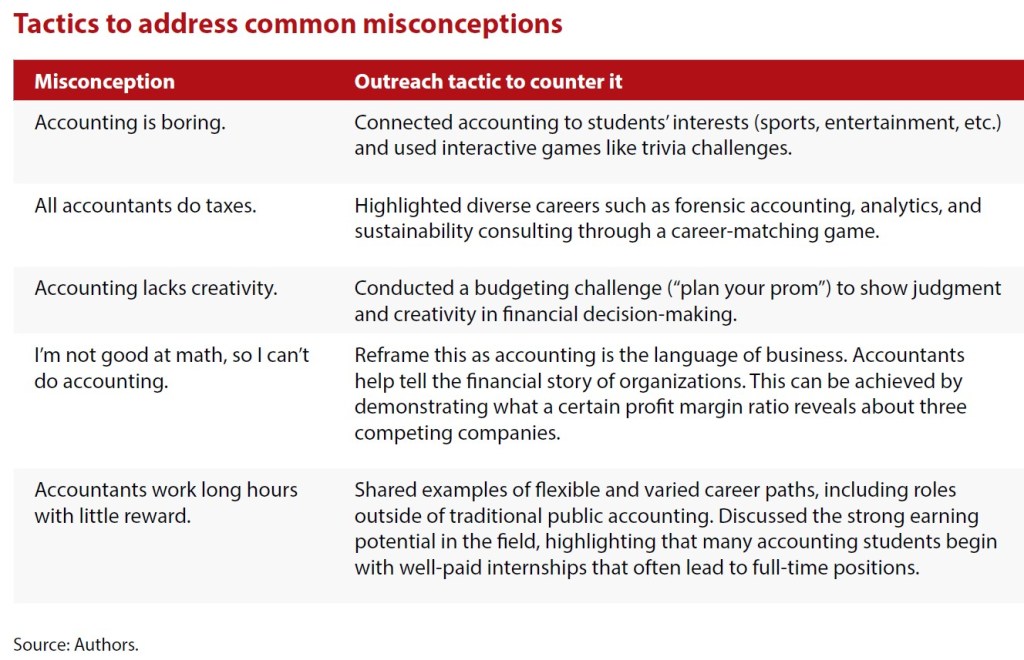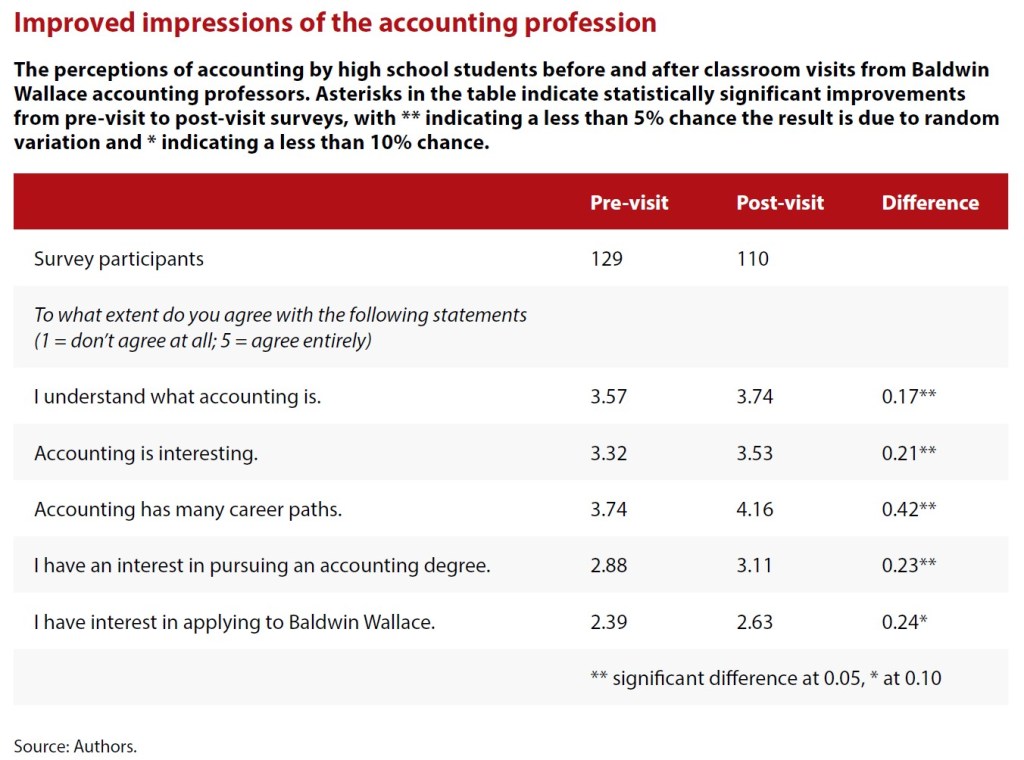- feature
- PIPELINE
High school outreach to boost the accounting pipeline
Interactive presentations related to the students’ interests increased awareness and interest in the accounting field.

Related
AICPA asks Department of Education to list accounting as a professional degree
Talent shuffle: Why people want to change jobs and how leaders can adapt
Apprenticeship program participant aces CGMA case study exam
Accounting faculty members at Baldwin Wallace University in the western Cleveland suburb of Berea, Ohio, visited local high school classrooms and connected with students during the 2023–2024 and the 2024–2025 academic years, hoping to reframe accounting as an exciting, dynamic, and versatile career path.
It worked.
Short surveys taken before and after the classroom visits suggest that students’ understanding of the profession, their interest in pursuing an accounting degree, and their awareness of diverse career paths improved.
“I learned that every company needs accountants because of how necessary they are in the business process, and they won’t all be kept at a desk, they get to travel the world,” said a junior at North Royalton High School in the fall of 2024. “This is helping me decide if I want to turn accounting into a career.”
Even students who may not ultimately pursue an accounting degree recognized the value in understanding accounting. “Accounting is the language of business, so understanding accounting will make business easier,” said a junior from Berea-Midpark High School after a visit from Baldwin Wallace faculty in the spring of 2024.
Local outreach initiatives like the one we have at Baldwin Wallace offer a powerful complement to national efforts to attract more students to pursue accounting degrees and complete the CPA licensure process.
Engaging students before they make decisions about college majors and offering them hands-on experiences can change their perceptions and encourage more of them to consider careers in accounting. A survey of more than 1,400 students in Ohio reported 52% of the respondents chose their major before starting college (see “How Students View the Accounting Profession,” JofA, June 1, 2023).
Victoria Semon, an accounting major at Baldwin Wallace, said the classroom visit to her high school in 2023 helped her make up her mind about her major and which university to attend.
“During the presentation, I realized I was more interested in Baldwin Wallace because I liked how [the presenter] described the accounting program,” Semon said.
HIGH SCHOOL OUTREACH AND ON-CAMPUS COMPETITIONS
During the past two academic years, Baldwin Wallace faculty organized two key initiatives.
Many high schools now offer accounting or business-related courses, and we have found teachers welcomed our faculty and sometimes students as guest speakers. In the first year, 2023–2024, faculty members visited 15 accounting or business classes at area high schools, followed by eight classes in the 2024–2025 academic year.
Rather than delivering traditional lectures, the presentations were interactive, connecting accounting to students’ interests, such as comparing accountants to scorekeepers in sports or demonstrating how accounting fuels industries like entertainment and technology. When possible, an accounting major who was a graduate of the high school participated in the classroom visit, offering a fresh perspective from someone closer to the high school students’ ages.
We also hosted accounting competitions in 2024 and 2025 that attracted 13 teams of three to four students from across area high schools.
The inaugural event challenged the high school students to present on accounting hot topics, such as artificial intelligence and cybersecurity. We changed gears for the second event to incorporate a variety of activities, which allowed student teams with different strengths to excel. Activities included accounting trivia games, a career-matching activity highlighting diverse accounting roles, and a budgeting challenge where students created and defended a prom budget.
For both the 2024 and 2025 events, each high school team was paired with a university accounting major serving as a student ambassador for the day, creating opportunities for informal discussions with someone closer to a peer but with much more accounting knowledge.
The activities showcased the creative and strategic aspects of accounting, directly countering stereotypes that accounting is “boring” or “only about taxes.” (See the chart, “Tactics to Address Common Misconceptions.”)

Three to five accounting firms sponsored the events and sent a firm representative and giveaways for the high school students. Graduates from our program working in accounting served as judges for the budget challenge.
RESULTS AND INSIGHTS
Surveys were administered before and after classroom visits from six of the eight schools visited in the 2024–25 academic year. The results indicate that students’ understanding of what accounting entails, their perception of whether accounting is interesting, their awareness of diverse career paths, and their interest in pursuing an accounting degree all improved following the classroom visits (see the table, “Improved Impressions of the Accounting Profession”).

High school students really seem to respond to hearing from current accounting majors in college like a junior at North Royalton High School after a visit in the fall of 2024.
“Thank you for the opportunity to speak to real [college] students going into accounting and teaching us more about what being an accountant is like and what they do for jobs, as well as the different types of [accountants],” the North Royalton junior said.
Thirty percent of the incoming 2025–2026 class of accounting majors at Baldwin Wallace University are from high schools that participated in either the classroom visit or the accounting competition.
The university plans to continue the classroom visits throughout the school year and to hold the accounting competition as an annual event during the spring semester.
LESSONS LEARNED AND RECOMMENDATIONS
Early experiences with student outreach point to several tactics that might work for universities, firms, and professional organizations:
Start early
Engage students in high school, or even middle school, before misconceptions take root. Identify area high schools with business or accounting courses, and reach out to offer visiting as a guest speaker in their classrooms.
Make it relatable
Connect accounting to areas students already find exciting. Begin by asking students about their interests, whether it’s music, sports, or future goals, and share personal stories to build rapport and show that accounting professionals are dynamic and approachable.
Before introducing accounting, we display a baseball scoreboard and engage students by asking questions of increasing difficulty: “What’s the score?”, “Is the game over?”, and “What does the E7 mean?” (error by the left fielder). This analogy helps students understand that, like scorekeeping in sports, accounting helps people interpret performance; the more fluent you are, the more you can understand.
Highlight diverse careers
Move beyond tax and audit roles to showcase specialties like forensic accounting, analytics, and environmental accounting. Sharing the number of well-paid internships that lead to full-time jobs upon graduation seems to get their attention, particularly when a current college student is delivering that message. This aligns with recent findings from the Center for Audit Quality (CAQ) that highlight that students are increasingly motivated by financial security and respond positively to messaging about accounting’s salary potential and long-term job stability. The CAQ is affiliated with the AICPA.
One effective way to spark curiosity is by starting with a trivia question: “Which of the following are career options for those with an accounting background?” All options listed should be correct, serving as a segue into a discussion or a matching activity that pairs job descriptions with job titles. Be sure to include roles such as entrepreneur, business owner, CFO, and environmental accountant to broaden students’ understanding of what accounting careers can look like.
Use interactive activities
Games, challenges, and real-world scenarios generate far more enthusiasm than passive lectures. Engagement increases when students participate in activities like trivia competitions or group-based challenges. These interactive formats encourage collaboration, creativity, and critical thinking, while making accounting feel more accessible and relevant.
Address stereotypes directly
Ask students what they think accounting is before beginning the session. This can be done through open discussion, anonymous polls, or quick word association. Common responses often include misconceptions such as “boring,” “just doing taxes,” or “only for people who are good at math.” Acknowledge these perceptions and use examples, activities, and personal stories to counter them. This refutation approach encourages students to reconsider their assumptions and see accounting as dynamic, creative, and full of opportunity.
About the authors
Jacqueline J. Wukich, CPA, Ph.D., is an assistant professor of accounting at Cleveland State University. Dan Schrag, CPA, CIA, MBA, is an associate professor of accounting at Baldwin Wallace University in the greater Cleveland area. To comment on this article or to suggest an idea for another article, contact Jeff Drew at Jeff.Drew@aicpa-cima.com.
LEARNING RESOURCE
The biggest event in the accounting profession will celebrate its 10th anniversary at the ARIA in Las Vegas. Don’t miss it!
June 8–11
CONFERENCE
For more information or to make a purchase, go to aicpa-cima.com/cpe-learning or call 888-777-7077.
MEMBER RESOURCES
Articles
“Pipeline Update: Perceptions of Accounting Brighten Among Students,” JofA, April 30, 2025
“Real-World Insights Inspire Students to Become Accountants,” AICPA & CIMA, Feb. 21, 2025
“CPAs Inspire the Next Generation in High School Classrooms,” AICPA & CIMA, Jan. 8, 2024
Websites
Whether you’re a CPA, state society representative, faculty member, university administrator, career counselor, or student presenter, the AICPA has created materials to aid your presentations and initiatives.
The premier online accounting game brought to you by the AICPA. Thought up by students, for students, this interactive game will test your fundamental accounting knowledge, give you a taste of real-world scenarios, and reinforce what you’re learning in the classroom.


















